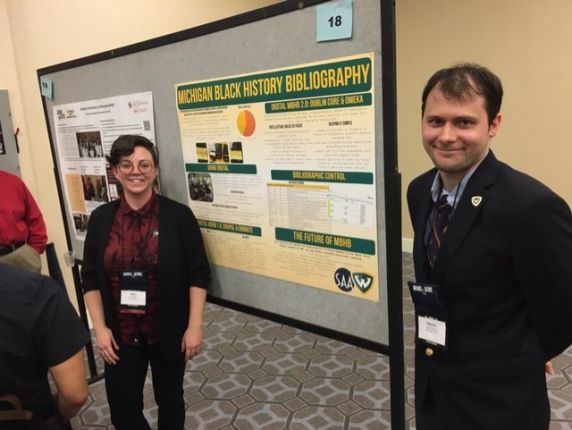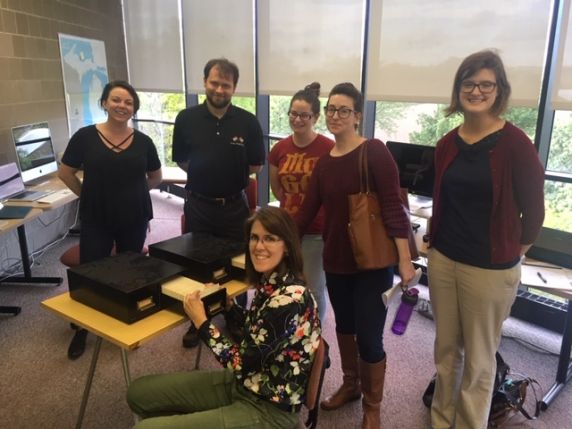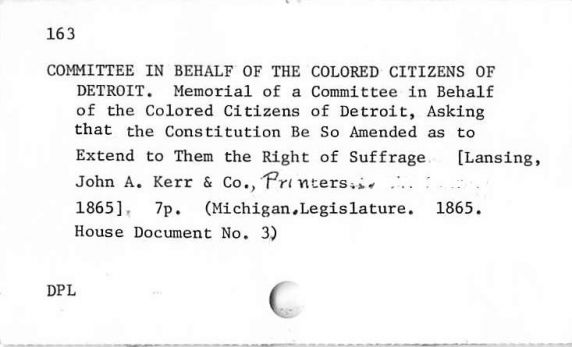The Michigan Black History Bibliography Now Available Online
By Alexandra Penn, Taylor Gibson, and Louis Jones
Wayne State University’s Walter P. Reuther Library, in partnership with the Wayne State University student chapter of the Society of American Archivists, is pleased to present an online version of the Michigan Black History Bibliography (MBHB), which originally existed as a card file. The online version of the card file contains hundreds of bibliographic references to sources illuminating the history of African Americans in Michigan up until the early 1970s.
The Michigan Black History Bibliography (MBHB) was created in the 1970s by Roberta McBride, a librarian at what is now the Walter P. Reuther Library of Labor and Urban Affairs at Wayne State University. McBride pulled together resources from various institutions and publications that told the story of African American history within the state of Michigan. In its original and online version, this resource covers three centuries of Michigan’s history with topics including slavery in Detroit in the 1700s, Underground Railroad activity in the 1800s, the racism and discrimination Blacks faced in the 1900s, and, throughout, efforts where African Americans worked to engage in community-building activities.
Some of the resources referenced in the bibliography include:
• Dissertations
• Theses
• Annotated bibliographies
• Reports
• Essays
• Pamphlets
• Research projects
• Broadsides
• And more
Dr. Louis Jones, Field Archivist at the Walter P. Reuther Library, adjunct faculty within Wayne State’s School of Information Sciences, and faculty advisor to the Wayne State student chapter of the Society of American Archivists (SAA), suggested that the student chapter take up as a project the digitization of the bibliography for use as an online resource. The project became an opportunity for these students to put into practice the skills they were learning in their studies, while providing a valuable online resource to patrons working on projects associated with Michigan’s Black history. Reuther Archivist and Digital Resource Specialist Paul Neirink assisted the students in conceptualizing the digital aspects of the project.
How the Website Was Constructed
With this backdrop, the student chapter devised a plan to scan the note cards, enter the data into Excel spreadsheets, and upload this data into a website, which was constructed using the software Omeka.
Before uploading the data into Omeka, students reviewed the metadata to ensure the information from the card file matched the data in the spreadsheet. After correcting for errors and using OCLC (Online Computing Library Center) as a guide, students then identified the institutions where the items were located and created links from the file cards to those institutions or the actual items within those institutions.
Students sought the institution closest to Wayne State for items whose file cards did not contain a location or where the location could not be verified. In either case, the entries for the items were listed to allow researchers to find the resources easily while using the bibliography.
The next task for the project was to upload all the data and associated images to each item into Omeka. Uploading the note cards themselves allows researchers to view the original record but also evaluate factors that might have been unknown to project members, such as abbreviations project members could not decode. The use of the website was facilitated when students added subject tags to the digitized note cards that comprise the website. The subject tags that the students applied to the digitized note cards will facilitate the use of the website by researchers. As each note card was processed, as described above, it was made publicly available on the site.
The utility of this bibliography notwithstanding, researchers may observe instances where they will find it difficult to determine exactly where, in a particular institution, they will be able to find a particular resource, as the original bibliography did not provide that level of specificity and project team members could not always identify where in the institution the item was located. That said, the bibliography will assuredly serve a meaningful level of importance for many of those who seek it out as a resource for their research, which previous testimonials have already indicated.
Testimonials
Researchers have put the bibliography to valuable use while it still existed in card file boxes at the Reuther Library. One of those is Professor Ula Taylor of the University of California, Berkeley. Following her research at the Reuther Library in 2007, she wrote a letter to Archivist Louis Jones extolling the importance of this resource. There, she maintains that, “I am still raving about you and the ‘black box of index cards’ to all of the librarians here at the University of California, Berkeley.”
More recently, Ron Soodalter had this to say about this resource:
In 2015, I discovered the [Michigan Black History Bibliography] while researching an article on a little-known civil rights case of the 1940s. Through the expert assistance of Louis Jones, I accessed files from the NAACP, as well as correspondences to and from Thurgood Marshall, all of which allowed me to assemble sufficient information for an accurate and informative piece. The article, which is scheduled to run in the June [2016] issue of The Progressive, would not have been possible without the information gleaned from the [bibliography].
As Taylor and Soodalter found, many major moments reflecting the intersection between Michigan and African American history are listed within. Now that the bibliography is accessible online, a much larger swath of researchers will have ready access to it, thereby enhancing the projects derived from those research efforts.
Team Members and Supporters
Some of the students and alumni involved in the groundwork for this project include
• Mattie Dugan and Allie Penn as project leaders
• Lauren Kennedy as a researcher
• Taylor Gibson as the practicum student engaged to complete the project
Others students and alumni who worked on this project include
• Nathaniel Arndts
• Jessica Biebuyck
• Melanie Carroll
• Colleen Cirocco
• Sarah Conrad
• Ana Corral
• Carady DeSimone
• Lori Eaton
• Kimberly Fisher
• Ellen Gleason
• Karlie Gryczewski
• Frances Heldt
• Janelle Manuel
• Natalie Piernak
• Brian Schamber
• Maggie Waligora
The initiative and hard work of these students are responsible for the success of this venture. Thanks are also merited by Kim Schroeder, the coordinator archival certificate program, which operates out of Wayne State’s School of Information Sciences. She supported Taylor Gibson seeking to pursue a practicum opportunity to work on this project.
 In the course of creating an online version of this bibliography, the student chapter presented their work in poster sessions at several conferences, including that of the Society of American Archivists annual meeting in Washington, D.C. in 2018. Poster presentations about the MBHB provided these students an opportunity to share their work while networking within the professional archival community.
In the course of creating an online version of this bibliography, the student chapter presented their work in poster sessions at several conferences, including that of the Society of American Archivists annual meeting in Washington, D.C. in 2018. Poster presentations about the MBHB provided these students an opportunity to share their work while networking within the professional archival community.
Financial Support
Allie Penn, a member of the student chapter, actively pursued and received funding from a 2018 Carnegie-Whitney Grant of the American Library Association (ALA). Because this useful resource had received very little exposure and use until Wayne State’s SAA student chapter decided to create an online version, the idea resonated with this granting agency. This funding, in turn, allowed for the hiring of a researcher to locate resources that comprise the bibliography.
In collaboration with the Wayne State University SAA student chapter, the Reuther Library is now pleased to present this work to its many researchers.



 Reddit
Reddit Facebook
Facebook LinkedIn
LinkedIn